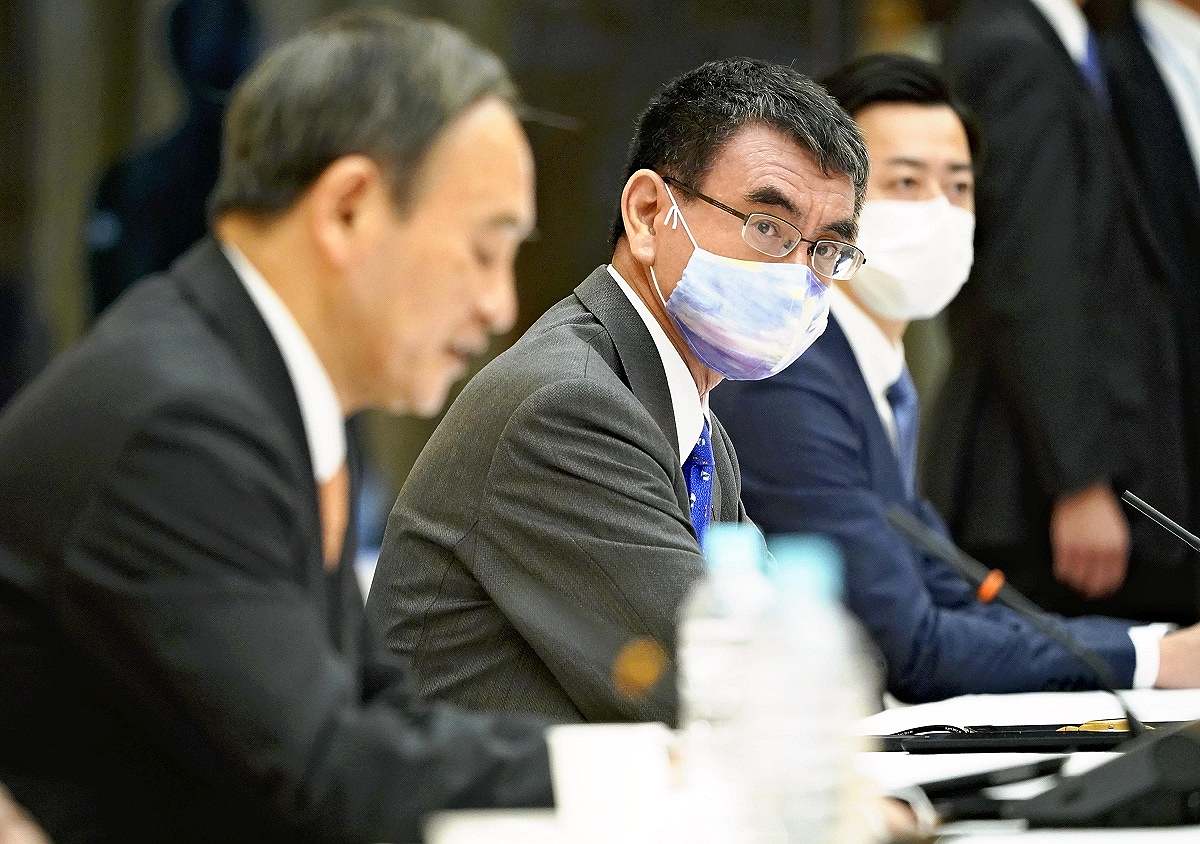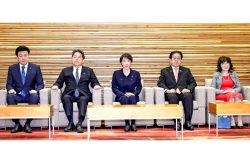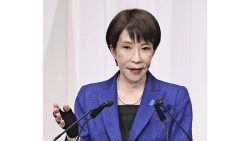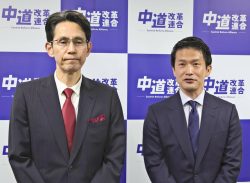
Taro Kono (center), the minister for administrative reform, attends the government’s Council for Promotion of Regulatory Reform meeting at the Prime Minister’s Office on Wednesday.
15:22 JST, December 10, 2020
Taro Kono’s reputation for being a nonconformist who gets things done was partly why Prime Minister Yoshihide Suga picked him as minister in charge of administrative and civil service reform, amid Suga’s drive to boost digitization of government administrative procedures.
While the recent announcement to abolish nearly all requirements for people to use hanko personal seals to get procedures approved was a win for Kono, he has made little tangible progress in fields where opposition from industry groups and bureaucratic sectionalism in ministries and agencies remain strong.
At a meeting Wednesday, the government’s Council for Promotion of Regulatory Reform received “interim reports” on steps taken to advance administrative reforms — a primary project of Suga, who chairs the council. Suga again emphasized the importance of making reforms from the perspective of the general public.
“If we leave these operations entirely to government offices, they inevitably tend to strictly follow precedent and their vertically structured bureaucracy,” Suga said.
During the meeting, paper materials were not distributed. Suga used a tablet to receive reports from Kono and other officials.
Suga held high expectations this year when he picked Kono for the post tasked with shaking up the government bureaucracy. A veteran politician elected eight times to the House of Representatives, Kono also was somewhat of a maverick in the Nagatacho and Kasumigaseki political nerve centers of Tokyo — and someone Suga expected could easily relate to the public.
There are some issues in Japan where multiple ministries and agencies have jurisdiction. During an open review process of administrative operations conducted in November, Kono cited 13 such issues in 11 fields, including kindergartens looking after children for extended hours. Suga has taken a keen interest in this extended-hours care, which was designed to reduce waiting lists for public day care centers. Kono instructed the Education, Culture, Sports, Science and Technology Ministry; Health, Labor and Welfare Ministry; and the Cabinet Office to transfer authority for these services to local governments, a move indicating his strong resolve to eliminate vertically segmented bureaucracy.
“It might sound like I’m tooting my own horn a little, but I think that was a very significant step,” Kono said at a press conference Wednesday.
After being appointed reform minister in September, Kono quickly made his presence felt by calling for a review of administrative procedures that require affixing a personal seal. In November, Kono decided that seals would no longer be necessary for more than 99% of 14,992 such procedures. Some documents that currently require a registered seal would continue to do so. Legal revisions will be needed to abolish the use of seals, and the government plans to submit bills for this during next year’s ordinary Diet session and pass the required legislation.
■ Backing down
Aside from abolishing the need to use personal seals, Kono’s reform drive has chalked up few significant achievements. Even some members of Kono’s Liberal Democratic Party remain unimpressed.
“Axing the use of unregistered seals was simply piggybacking on the unavoidable trend of people changing how they work during the coronavirus pandemic,” a former cabinet minister from the LDP grumbled.
Kono set up an online system on the Cabinet Office’s website where people could report excessive red tape and bureaucratic sectionalism. More than 7,000 reports and opinions flooded this “hotline” in about two months —– reportedly about the same number as would be reported over 10 years. The complaint hotline has since stopped accepting reports from the public.
The Fugen advanced thermal reactor also gave Kono an awkward moment during Wednesday’s meeting. The reactor in Tsuruga, Fukui Prefecture, is being decommissioned, and the topic turned to how to dispose of the reactor’s spent nuclear fuel. The announced results of the open review conducted by experts recommended that “consideration should be given to a safer, cheaper method.” Kono initially snapped that no funding would be set aside for the science ministry to go ahead with such a plan. However, after meeting with ministry officials for an explanation in private, Kono did an about-face and said he “understood” the plan.
■ Under microscope
The increased provision of online medical services has been the centerpiece of the Suga administration’s deregulation drive. However, the Japan Medical Association has resisted the shift to remote medical treatment. It looks likely that only family doctors will be permitted to offer such care online.
Kono also had set his sights on the Science Council of Japan, which he said would be screened “without exceptions” and “with its organization and number of personnel not off-limits.” Despite this, the report at Wednesday’s meeting called only for “transparency, fairness and neutrality” in the council’s financial contribution to the International Science Council.
Suga has positioned an energy strategy and increased digitization of government services as key elements of rebuilding the economy following the coronavirus pandemic. Given that an overhaul of the government’s administrative powers and deregulation will be essential for both, pushback from ministries, agencies and industry bodies is certain to intensify. Whether Kono is worth his salt as a reform minister looks set to face a stern test.
Top Articles in Politics
-

LDP Wins Historic Landslide Victory
-

LDP Wins Landslide Victory, Secures Single-party Majority; Ruling Coalition with JIP Poised to Secure Over 300 seats (UPDATE 1)
-

Japan Tourism Agency Calls for Strengthening Measures Against Overtourism
-

CRA Leadership Election Will Center on Party Rebuilding; Lower House Defeat Leaves Divisions among Former CDPJ, Komeito Members
-

Voters Using AI to Choose Candidates in Japan’s Upcoming General Election; ChatGPT, Other AI Services Found Providing Incorrect Information
JN ACCESS RANKING
-

Japan Institute to Use Domestic Commercial Optical Lattice Clock to Set Japan Standard Time
-

Israeli Ambassador to Japan Speaks about Japan’s Role in the Reconstruction of Gaza
-

Man Infected with Measles May Have Come in Contact with Many People in Tokyo, Went to Store, Restaurant Around When Symptoms Emerged
-

China Eyes Rare Earth Foothold in Malaysia to Maintain Dominance, Counter Japan, U.S.
-

Prudential Life Insurance Plans to Fully Compensate for Damages Caused by Fraudulent Actions Without Waiting for Third-Party Committee Review























